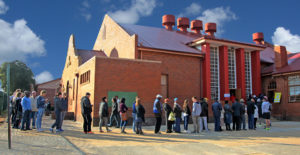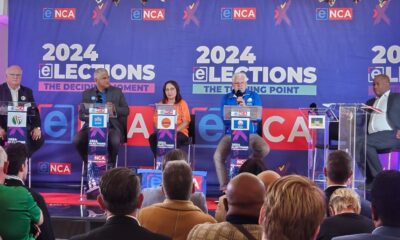
OpEds

ANC decline heralds fragile coalition government
The 2021 local government election continued the trend of the 2016 election, with more coalition governments, more losses from the African National Congress (ANC), and more unpredictability. The by-elections since then show more of the same.
Over the past five months, there have been 25 by-elections held across seven provinces. That’s about 0.6% of all the wards in South Africa, not a large sample but big enough to confirm some trends in the 2021 local government election and to corroborate what we see in the news and social media.
At a party level, these include the continued decline of the ANC, no growth from the Democratic Alliance (DA), and continued growth of ActionSA and the Patriotic Alliance (PA). This means more coalition politics beyond the metropolitan municipalities (metros), the Western Cape, and KwaZulu-Natal.
It’s the broader implication of fractured voting and voter apathy that are a concern. Our electoral system reduces the power of large parties and supports new and small parties. Five of the eight metros have coalition governments. Will more coalition governments lead to more instability?
At the ward level, the increased splintering of the vote has led to interesting outcomes. Ten of the 25 wards were won with less than 50% of the vote – in four of these wards, the winning candidate received less than 40%. The current record-holder, receiving just less than 32% of the vote, is an ANC candidate in Johannesburg Ward 53.
This is the downside of direct democracy and first-past-the-post voting – you can represent an area where less than a third of the voters chose you. But these anomalies are corrected at municipal (and national/provincial) level.
It’s clear that the ANC isn’t doing well and continues to shed support, not just in the metros but increasingly in rural wards. The party lost six of 21 wards it defended. The DA also lost support in the two wards it defended. The party retained both wards with less than a majority of the vote.
ActionSA, the PA, and Economic Freedom Fighters (EFF) have been the success stories of the by-elections. The EFF won three wards off the ANC. Though ActionSA and the PA didn’t win any wards, their growth prospects look better over the medium term, particularly ActionSA.

Beyond by-elections: the health of local government
The by-election results help to predict the fortune of political parties, but they don’t speak to the quality or stability of local government. Our MetroMonitor project measures the political risk across the eight metros, and identifies the trends across different coalitions.
It’s been just eight months since the local government election, and already one metro has been placed under administration (Mangaung) and another (Nelson Mandela Bay) is perilously close to the same fate. Councillor assassinations and factional violence have been rife in both municipalities as well as eThekwini and Buffalo City.
It’s no coincidence that all four metros are under ANC control, either by majority or in coalition. There are ongoing reports of corruption and service delivery failures in all four. Honest coalition partners in Nelson Mandela Bay have left the coalition in disgust while pliable opposition politicians in eThekwini voted with the ANC to award themselves large bonuses.
Though the DA-led coalitions in Johannesburg, Tshwane, and Ekurhuleni haven’t been a picnic, they’ve managed to remain intact, to compromise on council positions, and to pass critical legislation, including the 2022/2023 budgets. The success is partly due to skilled negotiation, partly luck, and partly a maturity of the coalition partners – the DA, ActionSA, FF+ (Freedom Front Plus), ACDP (African Christian Democratic Party), and COPE.
The coalition – and the DA particularly – are lucky that Herman Mashaba left the Johannesburg council to build his party nationally ahead of the 2024 national/provincial election. There were too many big egos within the coalition’s tent in the first few months. The coalition is also lucky that the ANC has become so radioactive that the EFF would rather support DA mayoral candidates than work with the ANC.
The coalition partners in the Gauteng metros have been more willing to compromise: in Johannesburg, there are at least eight parties represented in the mayoral committee and the other committees. These include the PA, Inkatha Freedom Party, and even the UDM (United Democratic Movement). The UDM chair is an interesting example of how the different parties are providing checks and balances and keeping each other accountable.
She’s chair of the municipal public accounts committee, a powerful committee with strong oversight powers. Both the DA and ANC caucuses voted for her, which is a big boost to independence and transparency in the metro.
There are at least two other examples: the coalition parties voting for EFF proposals in the Ekurhuleni council, and the DA and ActionSA compromising on the adjustment budget in Tshwane in order to pass it by deadline.
The ANC, however, is struggling to hold its coalitions together and struggling with governance and transparency when it’s in majority. It’s not an exaggeration or an unfair generalisation to say that the party is the common denominator in corruption and mismanagement.
Coalition governments are an increasing reality in South African politics. There are no guarantees that the coalitions in Gauteng will continue to hold, but there’s a better blueprint now for how to make things work. We have to make sure that they work.
- Paul Berkowitz is a director at The Third Republic, a non-profit company that supports democratic participation and community development. MetroMonitor is an ongoing research project that reports on political/economic risk and service delivery in the eight metropolitan municipalities. See more at t3r.org.za










